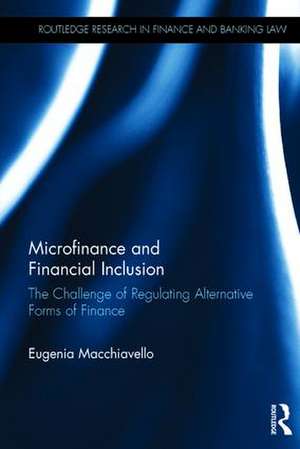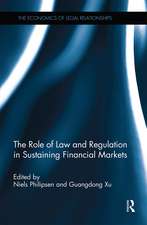Microfinance and Financial Inclusion: The challenge of regulating alternative forms of finance: Routledge Research in Finance and Banking Law
Autor Eugenia Macchiavelloen Limba Engleză Hardback – 27 iul 2017
This book considers microfinance from a legal and regulatory perspective. Microfinance is the provision of a wide range of financial services, particularly credit but also remittances, savings, to low-income people or financially excluded people. It combines a business structure with social inspiration, often resorts to technological innovations to lower costs (Fintech: e.g. crowdfunding and mobile banking) and merges with traditional local experiences (e.g. financial cooperatives and Islamic finance), this further complicating the regulatory picture. The book describes some of the unique dimensions of microfinance and the difficulties that this can cause for regulators, through a comparative analysis of selected European Union (EU) countries’ regimes. The focus is in fact on the EU legal framework, with some references to certain developing world experiences where relevant. The book assesses the impact and validity of current financial regulation principles and rules, in light of the most recent developments and trends in financial regulation in the wake of the financial crisis and compares microfinance with traditional banking. The book puts forward policy recommendations for regulators and policy makers to help address the challenges and opportunities offered by microfinance.
| Toate formatele și edițiile | Preț | Express |
|---|---|---|
| Paperback (1) | 389.66 lei 6-8 săpt. | |
| Taylor & Francis – 14 aug 2020 | 389.66 lei 6-8 săpt. | |
| Hardback (1) | 766.24 lei 6-8 săpt. | |
| Taylor & Francis – 27 iul 2017 | 766.24 lei 6-8 săpt. |
Din seria Routledge Research in Finance and Banking Law
-
 Preț: 296.25 lei
Preț: 296.25 lei -
 Preț: 313.17 lei
Preț: 313.17 lei -
 Preț: 295.91 lei
Preț: 295.91 lei -
 Preț: 324.77 lei
Preț: 324.77 lei -
 Preț: 325.49 lei
Preț: 325.49 lei -
 Preț: 325.64 lei
Preț: 325.64 lei - 18%
 Preț: 1002.68 lei
Preț: 1002.68 lei -
 Preț: 412.37 lei
Preț: 412.37 lei - 18%
 Preț: 892.30 lei
Preț: 892.30 lei - 18%
 Preț: 891.36 lei
Preț: 891.36 lei -
 Preț: 483.49 lei
Preț: 483.49 lei - 31%
 Preț: 765.45 lei
Preț: 765.45 lei -
 Preț: 490.62 lei
Preț: 490.62 lei -
 Preț: 389.66 lei
Preț: 389.66 lei -
 Preț: 417.96 lei
Preț: 417.96 lei -
 Preț: 354.33 lei
Preț: 354.33 lei - 18%
 Preț: 1108.10 lei
Preț: 1108.10 lei -
 Preț: 416.22 lei
Preț: 416.22 lei -
 Preț: 476.69 lei
Preț: 476.69 lei - 18%
 Preț: 1000.27 lei
Preț: 1000.27 lei - 18%
 Preț: 1000.27 lei
Preț: 1000.27 lei -
 Preț: 389.38 lei
Preț: 389.38 lei -
 Preț: 389.66 lei
Preț: 389.66 lei - 18%
 Preț: 1000.27 lei
Preț: 1000.27 lei - 12%
 Preț: 312.43 lei
Preț: 312.43 lei - 18%
 Preț: 1117.07 lei
Preț: 1117.07 lei - 26%
 Preț: 765.84 lei
Preț: 765.84 lei - 18%
 Preț: 898.57 lei
Preț: 898.57 lei - 18%
 Preț: 896.26 lei
Preț: 896.26 lei - 18%
 Preț: 1002.63 lei
Preț: 1002.63 lei -
 Preț: 405.66 lei
Preț: 405.66 lei - 18%
 Preț: 1057.89 lei
Preț: 1057.89 lei - 18%
 Preț: 836.89 lei
Preț: 836.89 lei - 18%
 Preț: 1051.55 lei
Preț: 1051.55 lei - 18%
 Preț: 1000.27 lei
Preț: 1000.27 lei
Preț: 766.24 lei
Preț vechi: 1028.60 lei
-26% Nou
Puncte Express: 1149
Preț estimativ în valută:
146.62€ • 153.47$ • 122.03£
146.62€ • 153.47$ • 122.03£
Carte tipărită la comandă
Livrare economică 31 martie-14 aprilie
Preluare comenzi: 021 569.72.76
Specificații
ISBN-13: 9781138652798
ISBN-10: 1138652792
Pagini: 322
Ilustrații: 11
Dimensiuni: 156 x 234 x 25 mm
Greutate: 0.57 kg
Ediția:1
Editura: Taylor & Francis
Colecția Routledge
Seria Routledge Research in Finance and Banking Law
Locul publicării:Oxford, United Kingdom
ISBN-10: 1138652792
Pagini: 322
Ilustrații: 11
Dimensiuni: 156 x 234 x 25 mm
Greutate: 0.57 kg
Ediția:1
Editura: Taylor & Francis
Colecția Routledge
Seria Routledge Research in Finance and Banking Law
Locul publicării:Oxford, United Kingdom
Public țintă
Postgraduate and UndergraduateCuprins
Introduction and executive summary. Microfinance and its "dimensions" Part I. Description of Microfinance: a creature of chameleonic nature 1. New frontiers and objectives of financial regulation 2. Microcredit and Microfinance: general characteristics Part II. Analysis of Microfinance "Dimensions" from a regulatory point of view 3. Dimension I: Microfinance as multi-facets creature: the legal enigma and different levels of regulation 4. Dimension II: the social objective within the business structure and social effectiveness 5. Dimension III: economic sustainability/effectiveness 6. Dimension IV: Microfinance as an alternative to traditional banking with "peculiar" instruments. The fundamental problem of regulating microfinance 7. Dimension V: Microfinance as an innovative chameleon: the ability to take advantage of new technologies 8. Dimension VI: Microfinance as a responsible activity: client protection without curtailing access 9. Final Conclusions
Notă biografică
Eugenia Macchiavello is a Lecturer/Adjunct Professor in Banking Law at the University of Genoa and Senior Research Fellow at the Genoa Centre for Law and Finance.
Descriere
This book considers microfinance from a legal perspective. The book describes the unique dimensions of microfinance and the difficulties which this can cause for regulators. The focus is on the European Union framework, with some references to some developing world experiences where relevant. The book assesses the impact and validity of current financial regulation principles and rules, in light of the most recent developments and trends in financial regulation and compares microfinance with traditional banking. The book puts forward policy recommendations for regulators and policy makers to help address the challenges and opportunities offered by microfinance.










